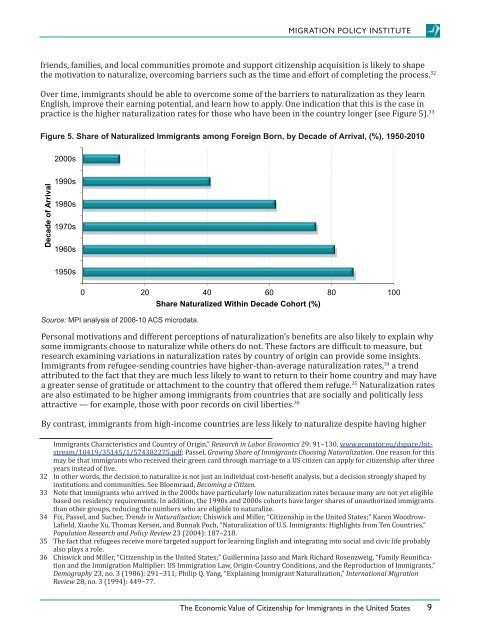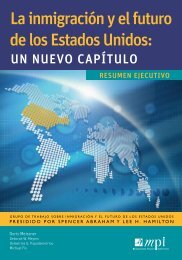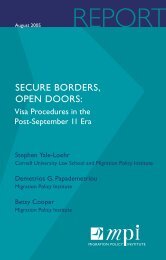The Economic Value of Citizenship for Immigrants in the United States
The Economic Value of Citizenship for Immigrants in the United States
The Economic Value of Citizenship for Immigrants in the United States
You also want an ePaper? Increase the reach of your titles
YUMPU automatically turns print PDFs into web optimized ePapers that Google loves.
MIgrATIoN PolICY INSTITUTe<br />
friends, families, and local communities promote and support citizenship acquisition is likely to shape<br />
<strong>the</strong> motivation to naturalize, overcom<strong>in</strong>g barriers such as <strong>the</strong> time and ef<strong>for</strong>t <strong>of</strong> complet<strong>in</strong>g <strong>the</strong> process. 32<br />
Over time, immigrants should be able to overcome some <strong>of</strong> <strong>the</strong> barriers to naturalization as <strong>the</strong>y learn<br />
English, improve <strong>the</strong>ir earn<strong>in</strong>g potential, and learn how to apply. One <strong>in</strong>dication that this is <strong>the</strong> case <strong>in</strong><br />
practice is <strong>the</strong> higher naturalization rates <strong>for</strong> those who have been <strong>in</strong> <strong>the</strong> country longer (see Figure 5). 33<br />
Figure 5. Share <strong>of</strong> Naturalized <strong>Immigrants</strong> among Foreign Born, by Decade <strong>of</strong> Arrival, (%), 1950-2010<br />
Decade <strong>of</strong> Arrival<br />
2000s<br />
1990s<br />
1980s<br />
1970s<br />
1960s<br />
1950s<br />
0 20 40 60 80 100<br />
Source: mpi analysis <strong>of</strong> 2008-10 acS microdata.<br />
Share Naturalized With<strong>in</strong> Decade Cohort (%)<br />
Personal motivations and different perceptions <strong>of</strong> naturalization’s benefits are also likely to expla<strong>in</strong> why<br />
some immigrants choose to naturalize while o<strong>the</strong>rs do not. <strong>The</strong>se factors are difficult to measure, but<br />
research exam<strong>in</strong><strong>in</strong>g variations <strong>in</strong> naturalization rates by country <strong>of</strong> orig<strong>in</strong> can provide some <strong>in</strong>sights.<br />
<strong>Immigrants</strong> from refugee-send<strong>in</strong>g countries have higher-than-average naturalization rates, 34 a trend<br />
attributed to <strong>the</strong> fact that <strong>the</strong>y are much less likely to want to return to <strong>the</strong>ir home country and may have<br />
a greater sense <strong>of</strong> gratitude or attachment to <strong>the</strong> country that <strong>of</strong>fered <strong>the</strong>m refuge. 35 Naturalization rates<br />
are also estimated to be higher among immigrants from countries that are socially and politically less<br />
attractive — <strong>for</strong> example, those with poor records on civil liberties. 36<br />
By contrast, immigrants from high-<strong>in</strong>come countries are less likely to naturalize despite hav<strong>in</strong>g higher<br />
<strong>Immigrants</strong> Characteristics and Country <strong>of</strong> Orig<strong>in</strong>,” Research <strong>in</strong> Labor <strong>Economic</strong>s 29: 91−130, www.econstor.eu/dspace/bitstream/10419/35145/1/574382275.pdf;<br />
Passel, Grow<strong>in</strong>g Share <strong>of</strong> <strong>Immigrants</strong> Choos<strong>in</strong>g Naturalization. One reason <strong>for</strong> this<br />
may be that immigrants who received <strong>the</strong>ir green card through marriage to a US citizen can apply <strong>for</strong> citizenship after three<br />
years <strong>in</strong>stead <strong>of</strong> five.<br />
32 In o<strong>the</strong>r words, <strong>the</strong> decision to naturalize is not just an <strong>in</strong>dividual cost-benefit analysis, but a decision strongly shaped by<br />
<strong>in</strong>stitutions and communities. See Bloemraad, Becom<strong>in</strong>g a Citizen.<br />
33 Note that immigrants who arrived <strong>in</strong> <strong>the</strong> 2000s have particularly low naturalization rates because many are not yet eligible<br />
based on residency requirements. In addition, <strong>the</strong> 1990s and 2000s cohorts have larger shares <strong>of</strong> unauthorized immigrants<br />
than o<strong>the</strong>r groups, reduc<strong>in</strong>g <strong>the</strong> numbers who are eligible to naturalize.<br />
34 Fix, Passel, and Sucher, Trends <strong>in</strong> Naturalization; Chiswick and Miller, “<strong>Citizenship</strong> <strong>in</strong> <strong>the</strong> <strong>United</strong> <strong>States</strong>;” Karen Woodrow-<br />
Lafield, Xiaohe Xu, Thomas Kersen, and Bunnak Poch, “Naturalization <strong>of</strong> U.S. <strong>Immigrants</strong>: Highlights from Ten Countries,”<br />
Population Research and Policy Review 23 (2004): 187–218.<br />
35 <strong>The</strong> fact that refugees receive more targeted support <strong>for</strong> learn<strong>in</strong>g English and <strong>in</strong>tegrat<strong>in</strong>g <strong>in</strong>to social and civic life probably<br />
also plays a role.<br />
36 Chiswick and Miller, “<strong>Citizenship</strong> <strong>in</strong> <strong>the</strong> <strong>United</strong> <strong>States</strong>;” Guillerm<strong>in</strong>a Jasso and Mark Richard Rosenzweig, “Family Reunification<br />
and <strong>the</strong> Immigration Multiplier: US Immigration Law, Orig<strong>in</strong>-Country Conditions, and <strong>the</strong> Reproduction <strong>of</strong> <strong>Immigrants</strong>,”<br />
Demography 23, no. 3 (1986): 291−311; Philip Q. Yang, “Expla<strong>in</strong><strong>in</strong>g Immigrant Naturalization,” International Migration<br />
Review 28, no. 3 (1994): 449−77.<br />
<strong>The</strong> economic <strong>Value</strong> <strong>of</strong> <strong>Citizenship</strong> <strong>for</strong> <strong>Immigrants</strong> <strong>in</strong> <strong>the</strong> <strong>United</strong> <strong>States</strong><br />
9




